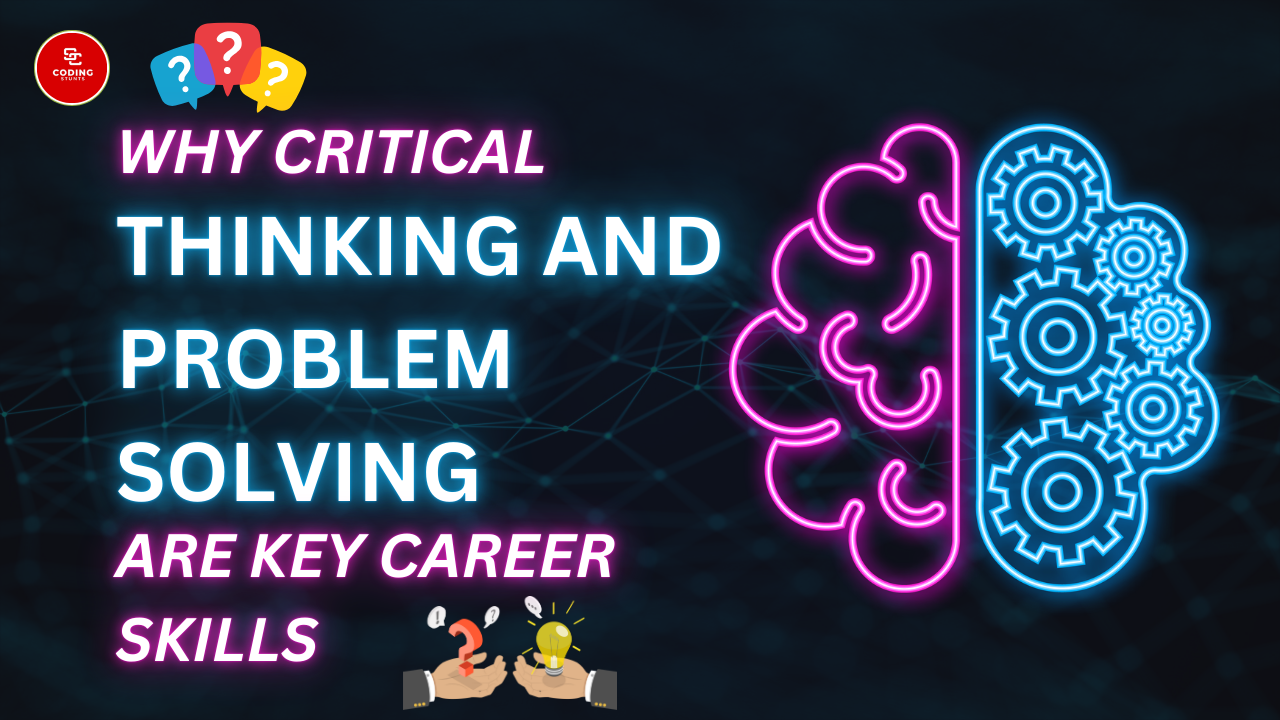


In today’s fast-paced world, career success is no longer just about technical skills. Employers are increasingly valuing critical thinking and problem-solving abilities in their workforce. Whether you’re navigating a complex project, working on a tight deadline, or encountering an unexpected challenge, these skills can make a huge difference in how you respond, adapt, and succeed. In this post, we’ll explore why critical thinking and problem-solving are vital in the modern workplace and how you can develop these abilities to advance in your career.
Critical thinking involves analyzing information, evaluating different perspectives, and making reasoned judgments. It’s about asking the right questions, looking beyond surface-level answers, and using logic and reasoning to make decisions. A critical thinker is someone who doesn’t accept things at face value but digs deeper to understand underlying causes, patterns, and implications.
Imagine you’re in a team meeting, and a product you’ve been working on is facing delays. A critical thinker will question why the delays are happening, look for potential inefficiencies in the workflow, and propose solutions. Instead of reacting emotionally or placing blame, they analyze the situation logically to find ways to improve.
Example Interactive Exercise:
Problem solving is the ability to find solutions to difficult or complex issues. It’s about identifying the root cause of a problem and then developing strategies to resolve it effectively. In the workplace, problems arise frequently, whether it’s an unexpected system failure, a challenging client request, or a supply chain hiccup. Strong problem-solving skills enable you to tackle these issues head-on, minimizing the impact on your work.
For example, if a key supplier suddenly raises their prices, a problem-solver would quickly assess the situation, explore alternative suppliers, negotiate better terms, or find ways to offset the cost increase without compromising the project.
Interactive Tip:
Try this approach for problem-solving in your own work:
In today’s business world, change is constant. Critical thinkers and problem solvers are adaptable and can manage change more effectively because they can anticipate challenges, think on their feet, and adjust their strategies quickly. This agility is especially valuable in industries like technology, where new developments happen rapidly.
Good decision-making relies on critical thinking and problem-solving. Rather than making impulsive decisions, employees who excel in these areas will gather data, analyze the facts, and consider all available options. This leads to more thoughtful and effective solutions that benefit both the individual and the organization.
Example Interactive Poll:
You’re faced with two job offers: one offers higher pay but less career growth, and the other has lower pay but excellent development opportunities. Which do you choose, and why?
Reflect on the long-term career benefits of each option to enhance your decision-making process.
When teams encounter problems, collaboration is key to finding solutions. Critical thinkers listen to others’ ideas, evaluate different approaches, and contribute constructively to team discussions. This encourages innovation and creativity within teams, which can result in better project outcomes.
Interactive Team Activity:
Next time your team faces a roadblock, suggest a brainstorming session. Encourage everyone to share their ideas freely and explore unconventional solutions. You might discover a creative answer to a seemingly difficult problem.
Employees who can think critically and solve problems efficiently help to streamline operations, minimize delays, and keep projects on track. They’re able to identify bottlenecks, suggest improvements, and implement changes that increase overall productivity. In contrast, those who struggle with these skills may get bogged down by challenges and fall behind.
Interactive Thought Challenge:
Think of a current process at your job that seems inefficient. How could you improve it using your problem-solving skills? Map out a plan to present to your supervisor.
Ask Questions
Don’t settle for the first solution that comes to mind. Ask questions like “Why is this happening?” and “What are the possible outcomes?” to dive deeper into issues. The more you question, the more thorough your thinking becomes.
Practice Reflection
After facing a challenge, take time to reflect on what went well and what could have been improved. This will help you hone your problem-solving skills and improve for future situations.
Learn from Others
Collaborate with colleagues who excel in critical thinking and problem-solving. Observe how they approach problems and ask for their insights. Learning from their methods can give you new perspectives.
Embrace Challenges
Don’t shy away from difficult tasks or projects. The more you challenge yourself, the more opportunities you have to practice and refine your critical thinking and problem-solving abilities.
Interactive Tip for Self-Improvement:
Try a daily challenge: Identify one problem in your personal or professional life and think through different ways to solve it. This will help you become more adept at approaching issues from multiple angles.
Critical thinking and problem-solving are not just buzzwords; they are essential career skills that can set you apart in the workplace. As businesses continue to evolve and face new challenges, professionals with these abilities will be in high demand. By developing and practicing these skills, you can become a more valuable team member, improve your decision-making, and advance in your career.
Interactive Final Question:
What’s one way you plan to improve your critical thinking or problem-solving skills this week? Share your thoughts in the comments below!
Comments are closed